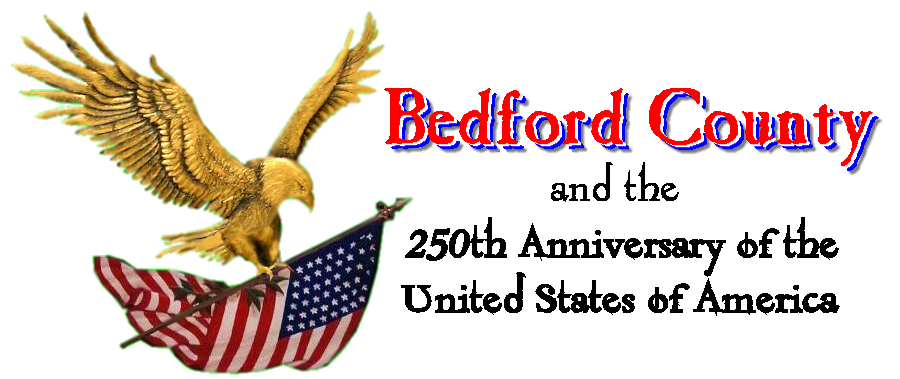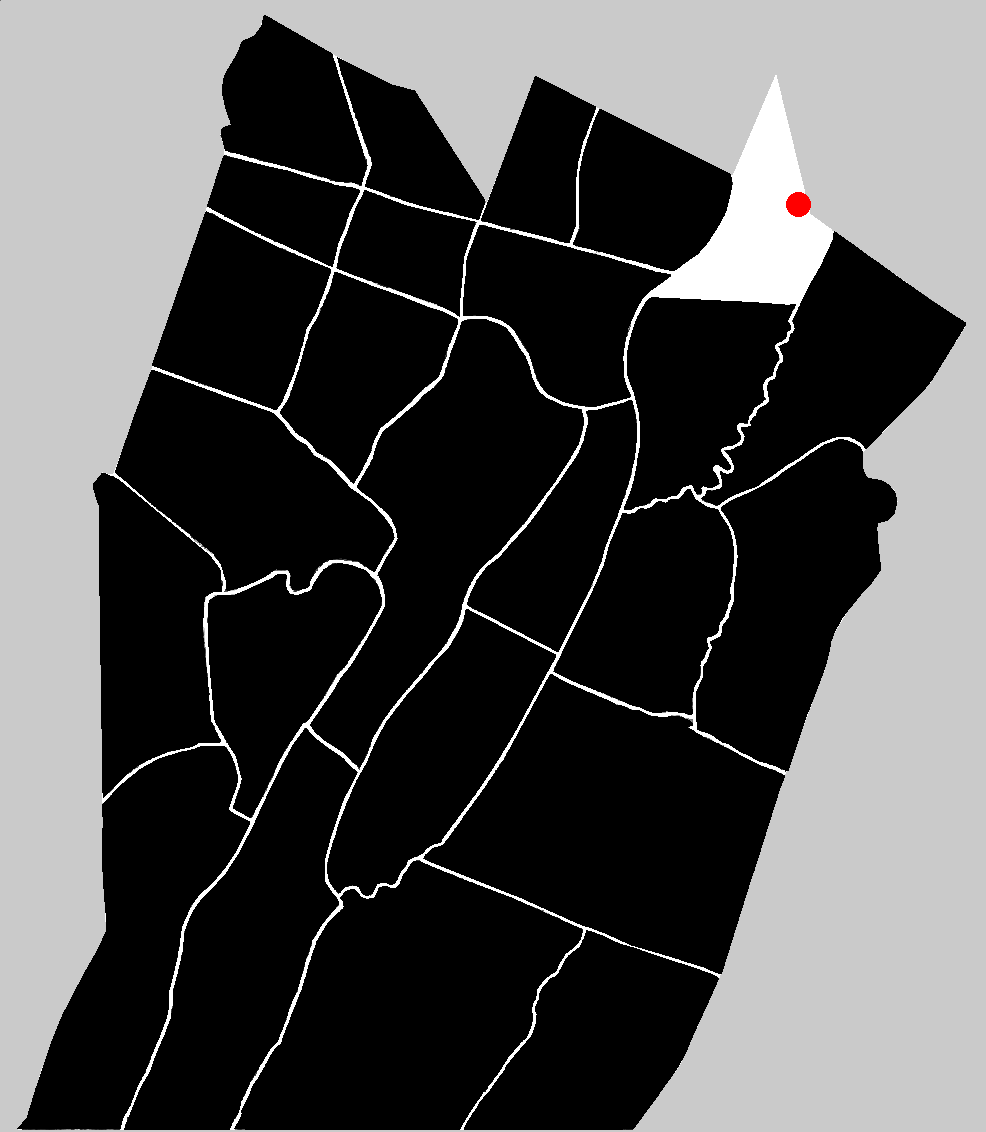


![]() Robert Friggs filed an application (No. 2957) for a warrant for a tract of land along the east side of the Raystown Branch of the Juniata River on 03 March 1767. The tract contained two hundred and ninety-one acres "including his Improvement between Frederick Founders & William Sparks". An actual warrant was never issued for Robert Friggs, and the tract of land was not surveyed until 20 May 1777. By the time that the tract was surveyed, Philip Stone(r) had purchased the lands to the west from William Sparks. According to the survey, it was "a tract of land called Miller's Hall situate on East side of the Raystown branch of Juniata below William Sparks's place in Hopewell township in the County of Bedford containing two hundred and ninety one acres and the usual allowance of six pcent for roads &c surveyed the 20th day of May 1777 for Robert Friggs in pursuance of an order No 2957 dated the 3d day of March 1767."
Robert Friggs filed an application (No. 2957) for a warrant for a tract of land along the east side of the Raystown Branch of the Juniata River on 03 March 1767. The tract contained two hundred and ninety-one acres "including his Improvement between Frederick Founders & William Sparks". An actual warrant was never issued for Robert Friggs, and the tract of land was not surveyed until 20 May 1777. By the time that the tract was surveyed, Philip Stone(r) had purchased the lands to the west from William Sparks. According to the survey, it was "a tract of land called Miller's Hall situate on East side of the Raystown branch of Juniata below William Sparks's place in Hopewell township in the County of Bedford containing two hundred and ninety one acres and the usual allowance of six pcent for roads &c surveyed the 20th day of May 1777 for Robert Friggs in pursuance of an order No 2957 dated the 3d day of March 1767."
![]() Robert Friggs sold a portion of the tract (two hundred acres) to Sebastian Schaub (variously, Shaub, Shoup, Shoop) on 01 July 1777. The transaction was recorded in the Bedford County Court House on 06 August 1785.
Robert Friggs sold a portion of the tract (two hundred acres) to Sebastian Schaub (variously, Shaub, Shoup, Shoop) on 01 July 1777. The transaction was recorded in the Bedford County Court House on 06 August 1785.
![]() Sebastian Shaub had come to this region a couple years earlier, but never warranted any land. Like many others, he apparently just settled on the land and claimed that he owned it. The name of Boston Shoaf first appeared on the resident return of Barree Township in 1770 with fifty acres 'valued'. When an entry was made in a tax return noting acreage 'valued' and no horses or cattle listed, it usually meant that the person was actually a 'non-resident'. Bostian Shope was listed on the return for Barree Township in 1771 with two horses and one cow listed. That indicates that he probably had just moved into the region in 1779, but didn't have a house built or any land under cultivation until 1771.
Sebastian Shaub had come to this region a couple years earlier, but never warranted any land. Like many others, he apparently just settled on the land and claimed that he owned it. The name of Boston Shoaf first appeared on the resident return of Barree Township in 1770 with fifty acres 'valued'. When an entry was made in a tax return noting acreage 'valued' and no horses or cattle listed, it usually meant that the person was actually a 'non-resident'. Bostian Shope was listed on the return for Barree Township in 1771 with two horses and one cow listed. That indicates that he probably had just moved into the region in 1779, but didn't have a house built or any land under cultivation until 1771.
![]() According to the account presented in the History of Bedford, Somerset and Fulton Counties, Sebastian Shoup's sons, Henry and David Shoup sold a large portion of the land in 1853 and 1855 to James Saxton and Jacob Fockler of Huntingdon and that Saxton and Fockler laid out the town soon after the purchases. The will of Sebastian Shoub listed sons Joseph, Henrey and Abram. Either he did not have a son named David, or he simply did not bequeath anything to him. In 1801 and 1803, Henry Shoup conveyed land to Joseph Shoup and Abraham Shoup respectively. He did not convey any land to any man by the name of David.
According to the account presented in the History of Bedford, Somerset and Fulton Counties, Sebastian Shoup's sons, Henry and David Shoup sold a large portion of the land in 1853 and 1855 to James Saxton and Jacob Fockler of Huntingdon and that Saxton and Fockler laid out the town soon after the purchases. The will of Sebastian Shoub listed sons Joseph, Henrey and Abram. Either he did not have a son named David, or he simply did not bequeath anything to him. In 1801 and 1803, Henry Shoup conveyed land to Joseph Shoup and Abraham Shoup respectively. He did not convey any land to any man by the name of David.
![]() The only deed available in the Bedford County Office of the Register and Recorder regarding the Shoup sons and James Saxton and Jacob Fockler is one in which Henry Shoup sold a tract of land to Jacob Fockler on 31 March 1855. That Henry Shoup would have been Henry Shoup Junior. Henry, Sebastian's son, conveyed one hundred and eighty-six acres and one hundred and twenty-seven perches to his son, Henry on 23 May 1837. The father retained one acre of land on which the house he and his wife, Barbara, were living in. The deed described the tract and noted that it was part of the larger tract surveyed to Robert Friggs on his application No. 2957. The deed also noted that "the larger tract of land afore described was patented to the said Henry Shoup as Executor of Sebastian Shoup March the eighth 1797 and Inrolled in the Rolls Office for the State of Pennsylvania in Patent Book No. 30 page 321."
The only deed available in the Bedford County Office of the Register and Recorder regarding the Shoup sons and James Saxton and Jacob Fockler is one in which Henry Shoup sold a tract of land to Jacob Fockler on 31 March 1855. That Henry Shoup would have been Henry Shoup Junior. Henry, Sebastian's son, conveyed one hundred and eighty-six acres and one hundred and twenty-seven perches to his son, Henry on 23 May 1837. The father retained one acre of land on which the house he and his wife, Barbara, were living in. The deed described the tract and noted that it was part of the larger tract surveyed to Robert Friggs on his application No. 2957. The deed also noted that "the larger tract of land afore described was patented to the said Henry Shoup as Executor of Sebastian Shoup March the eighth 1797 and Inrolled in the Rolls Office for the State of Pennsylvania in Patent Book No. 30 page 321."
![]() On the thirtieth day of April 1860 Henry Shoup, James Saxton and Jacob Fockler traveled to the Bedford County Court House to file two deeds, one of which had been devised in 1855 and one in 1857.
On the thirtieth day of April 1860 Henry Shoup, James Saxton and Jacob Fockler traveled to the Bedford County Court House to file two deeds, one of which had been devised in 1855 and one in 1857.
![]() Henry Shoup sold a tract of one hundred and eighty-six acres and one hundred and twenty-seven perches to Jacob Fockler and James Saxton on 31 March 1855. The deed also included a tract of just five acres and sixty-four perches that Henry had acquired from Samuel Shoup on 15 May 1851 and a tract of fourteen acres that Henry acquired from Samuel at an unspecified date. The three tracts were deeded to Fockler and Saxton for the sum of $6,250.
Henry Shoup sold a tract of one hundred and eighty-six acres and one hundred and twenty-seven perches to Jacob Fockler and James Saxton on 31 March 1855. The deed also included a tract of just five acres and sixty-four perches that Henry had acquired from Samuel Shoup on 15 May 1851 and a tract of fourteen acres that Henry acquired from Samuel at an unspecified date. The three tracts were deeded to Fockler and Saxton for the sum of $6,250.
![]() On 08 July 1857, James Saxton sold to Jacob Fockler his interest in the property that Henry Shoup had sold to him and Jacob Fockler jointly. Fockler paid Saxton $3,000 for sole ownership of the tract. The deed of transfer noted that it included the land upon which the town of Saxton had been laid.
On 08 July 1857, James Saxton sold to Jacob Fockler his interest in the property that Henry Shoup had sold to him and Jacob Fockler jointly. Fockler paid Saxton $3,000 for sole ownership of the tract. The deed of transfer noted that it included the land upon which the town of Saxton had been laid.
![]() Saxton was incorporated into a borough on 14 February 1866.
Saxton was incorporated into a borough on 14 February 1866.

